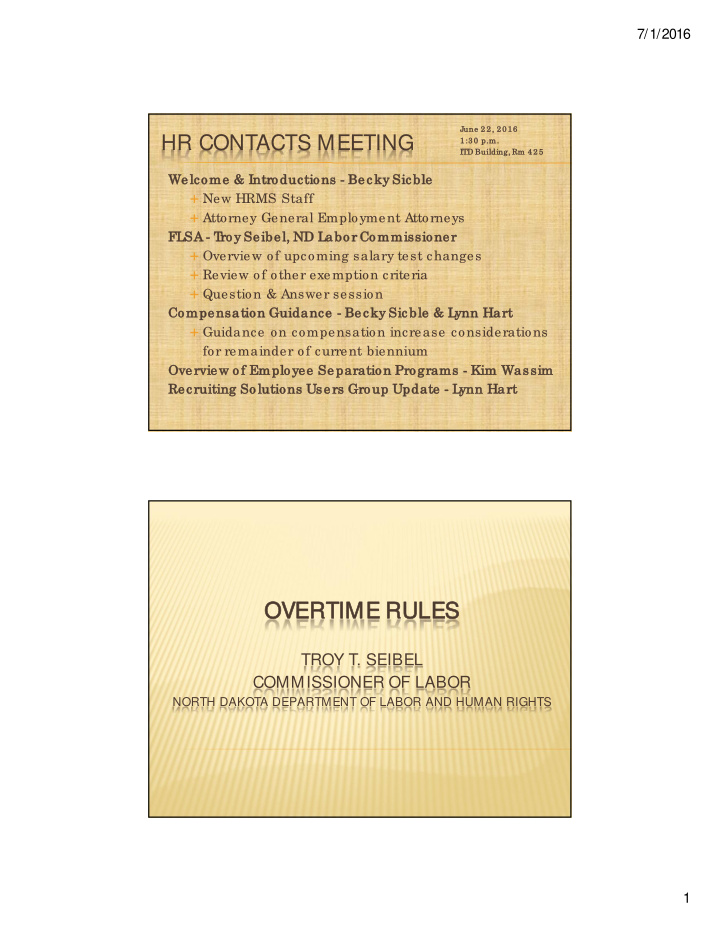



7/1/2016 Jun June e 2 2 , 2 2 , 2 0 2 016 HR CONTACTS MEETING 1 :3 0 p.m 1 :3 0 p .m. ITD B ITD Bui uild lding, g, Rm Rm 4 2 5 4 2 5 Welc elcome me & & Int Introduc ucti tions s - Becky Becky Sicb Sicble le É New HRMS Staff É Attorney General Employment Attorneys FLSA FL A - T roy S roy Sei eibel el, ND , ND La Labor r Co Commissioner issioner É Overview of upcoming salary test changes É Review of other exemption criteria É Question & Answer session Compens Compe nsat atio ion n Guidan Guidance - e - Becky Becky Sic Sicble ble & & Lynn ynn Ha Hart É Guidance on compensation increase considerations for remainder of current biennium Ove verview iew of f Employee S ployee Separati aration P on Prog rogram rams - s - Kim m Wa Wassim sim Recruitin ecruiting Solutio g Solutions ns Use Use rs rs Gr Group Up oup Upda date e - Lynn ynn Ha Hart OVE OVERTIME RTIME RU RULES LES TROY T. SEIBEL COMMISSIONER OF LABOR NORTH DAKOTA DEPARTMENT OF LABOR AND HUMAN RIGHTS 1
7/1/2016 OVERTIME Ò Who is exempt from overtime? - 4 primary exemptions - “Administrative” employees - “Executive” employees - “Professional” employees - “Highly compensated” employees Additional exemptions can be found in N.D.A.C. § 46-02-07-02(4) OVERTIME (CONT.) Ò “Administrative” employees are those whose primary duties consist of: - Performance of office or non-manual work directly related to management policies or general business operations of the employer, AND - Customarily and regularly exercise discretion and independent judgment Possible examples include: a project manager, finance manager, marketing manager, etc. N.D.A.C. § 46-02-07-01(1) 2
7/1/2016 OVERTIME (CONT.) Ò “Executive” employees are those whose primary duties consist of: - Management of the enterprise in which the employee is employed or of a customarily recognized department or subdivision, - Directs the work of two or more employees, AND - Authority to hire, fire, promote other employees (or ability to influence those decisions) Possible examples include president, CEO, vice president of international affairs, etc. N.D.A.C. § 46-02-07-01(6) OVERTIME (CONT.) Ò “Professional” employees are those whose primary duties consist of: - Work requiring knowledge of an advanced type in a field of science or learning customarily acquired by a prolonged course of specialized instruction and study, - Work requiring consistent exercise of discretion and judgment, AND - Work that is predominantly intellectual and varied in character and is of such character that the output produced or the result accomplished cannot be standardized in relation to a given period of time Possible examples include attorneys, physicians, etc. N.D.A.C. § 46-02-07-01(10) 3
7/1/2016 OVERTIME (CONT.) Ò A “highly compensated” employee is one who: - Paid total annualized compensation of $100,000 or more, - Receives at least $455/ week, AND - Primary duties consist of office or non- manual work N.D.A.C. § 46-02-07-01(7) OVERTIME (CONT.) Ò New overtime rule issued by USDOL - Current federal regulations require “administrative”, “executive”, and “professional” employees receive at least $455 per week ($23,660 per year) - New rule increases this floor to $913 per week ($47,476 per year) - Effective December 1, 2016 4
7/1/2016 OVERTIME (CONT.) Ò Employers frequently misclassify employees as exempt from overtime. Ò Costly – employees can recover up to two years of overtime pay (possibly three) Ò An employee cannot be both exempt and non- exempt (what are the employee’s primary duties? ) Ò Enforcement priority for USDOL QUESTIONS? CONTACT US: Ò Phone: (701) 328-2660 Ò T oll-Free: (800) 582-8032 Ò Web: www.nd.gov/ labor Ò Email: labor@ nd.gov 5
Recommend
More recommend